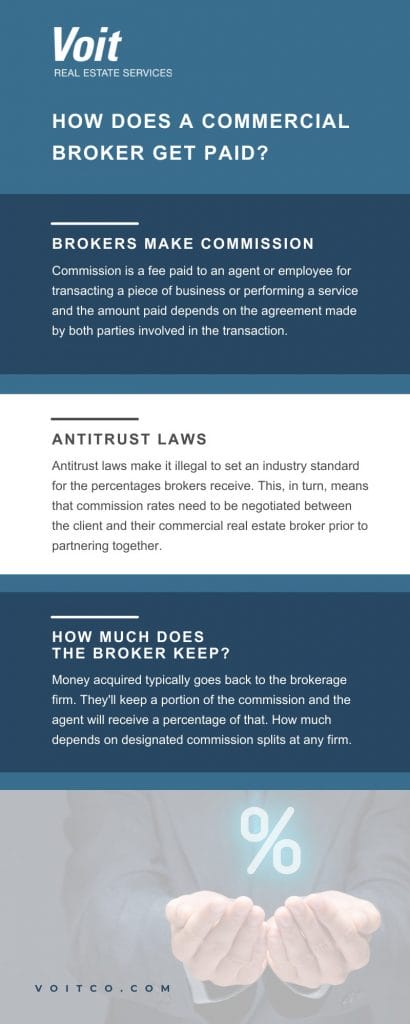
There are many reasons for hiring a commercial broker.
Some individuals who might consider hiring a commercial broker include:
- A landlord looking to find suitable tenants for their space
- A tenant seeking out a space that makes sense for their company
- An investor interested in buying or selling commercial property
Regardless of whether you’re a landlord, tenant, or investor, using an expert saves you time and money—because they do the footwork for you.
Hiring a commercial broker also means you have another person with experience watching your back. A broker can help ensure you make sound, considerate decisions based on your individual needs, which helps streamline your real estate transaction to ensure you receive the best deal.
All in all, when hiring a commercial broker, it’s not hard to see the value.
You may, however, be wondering how your best interests are being considered if your broker is technically making money off of you. The question arises: How does a commercial broker get paid? And who pays them? To alleviate confusion, Voit Real Estate Services is here to clarify the process.
Let’s discuss.

Your Broker Makes Commission
By definition, commission is “a fee paid to an agent or employee for transacting a piece of business or performing a service… a percentage of the money received from a total paid to the agent responsible for the business.”
Commercial brokers make their profit by taking a commission on each transaction that they facilitate. The commission amount paid depends on the agreement made by both parties involved in the transaction. This includes:
- Buyer and seller in the case of a sale, or
- Landlord and owner and tenant in the case of a lease
Now, how much do commercial brokers make with each closed transaction?
Antitrust Laws
Antitrust laws make it illegal to set an industry standard for the percentages brokers receive. This, in turn, means that commission rates need to be negotiated between the client and their commercial real estate broker prior to partnering together.
This opportunity to negotiate can be beneficial to both parties. And why? Consider various commercial property prices and the range of difficulty in property searches.
In other words, some property searches will require more work from the broker and they should be compensated as such. In fact, some commercial transactions can take months or even years to close.
Antitrust laws provide brokers an opportunity to negotiate a higher commission rate. Regardless, commission rates typically fall between 4-8% of the total transaction amount (sale price or lease value).
How Does Commission Work?
Commission in commercial real estate works differently based on if a property is being sold or leased. Let’s discuss the differences.
Commission Regarding Commercial Sales
A commercial broker receives a commission from the sale of commercial property through the representation of one or both parties involved in said transaction.
The exact commission they will receive cannot be accurately determined until negotiations on the sale price have been completed and all involved parties have agreed to a particular sale amount.
The commission percentage is typically higher on lower-priced sale properties and lower on higher-priced properties. If two brokers are involved in the transaction, the commission percentage will be split equally between them. The commission is traditionally paid by the seller, although this can be negotiated as well.
Real-Life Example
To give an example:
- A commercial property sells for $1 million with a negotiated commission percentage of 6%
- This means $60,000 of that sale price will be passed onto the broker.
- Note: If two brokers were working on the transaction (one representing the seller and the other, the buyer), they would split the commission. In this case, $30,000 each.
Commission Regarding Commercial Leases
A commercial broker can receive a commission off of a commercial lease by representing either the landlord/owner or the tenant (or both).
The commission is similarly calculated in this type of transaction by considering the overall value of the lease throughout its duration and taking a percentage of that.
If the owner and tenant have different brokers representing them, it will most likely be an even split between the two (unless otherwise specified in negotiation). The commission on a commercial lease is traditionally paid by the lessor and split into two payments. The first half of the commission is due at the lease signing and the second half is paid once the tenant is occupying the space.
Real-Life Example
To put this into perspective, let’s look at another example.
- Let’s say an owner and tenant agree on a lease for a 5-year term on a 3,000 square foot property at a rate of $10/square foot.
- 5 Years x (3,000 SF x $10) = $150,000 Total Lease Value
- If the broker(s) has negotiated a 5% commission off of this lease, $7,500 ($150,000 x .05) is allotted to the broker.
- Note: In the event that two brokers were facilitating the deal together, they would each stand to make $3,750.
How Much Does the Broker Keep?
The money acquired by each broker on the transaction typically goes back to the brokerage firm. From here, the brokerage will keep a portion of the commission and the agent will receive a percentage of that.
How much a broker receives is largely dependent upon the designated commission splits at any particular brokerage firm.
Every brokerage firm is different. Some have specified splits based on seniority, some are set at a certain percentage of the total up to a specific dollar value and then increase after the broker has reached a designated threshold of production, and so on.
Whether you are soon-to-be on your own property hunt or are interested in becoming a broker yourself, we hope that you walk away from this blog post with a better understanding of the value of working with a broker and where your money is going after your transaction is complete.
Read on for the pros and cons of becoming a CRE broker.

Contact the author